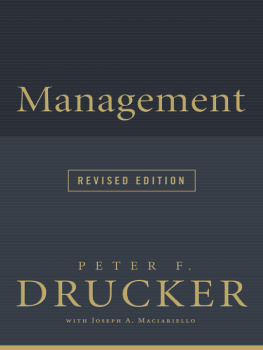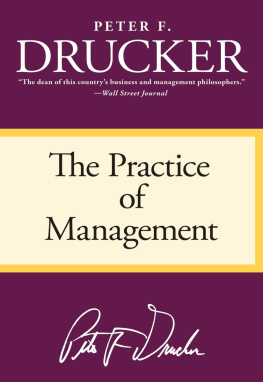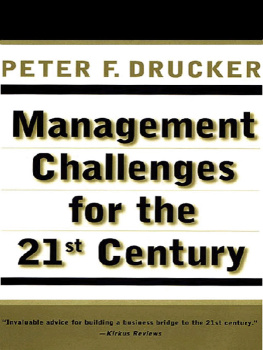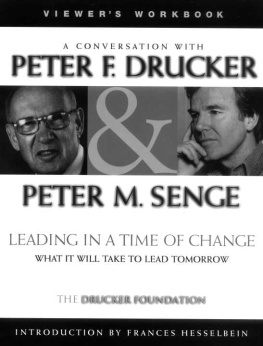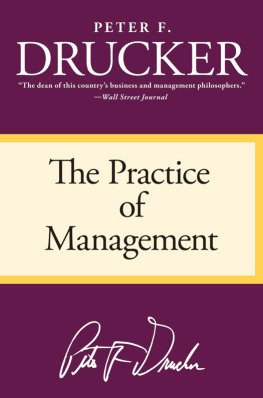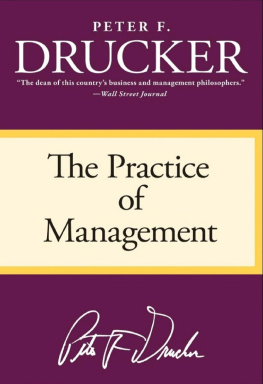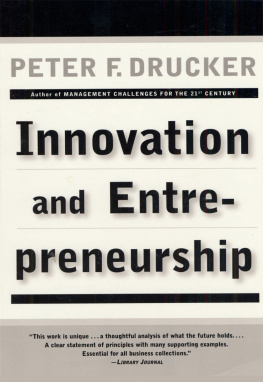Drucker - Management rev ed
Here you can read online Drucker - Management rev ed full text of the book (entire story) in english for free. Download pdf and epub, get meaning, cover and reviews about this ebook. year: 2014, publisher: HarperCollins e-Books, genre: Business. Description of the work, (preface) as well as reviews are available. Best literature library LitArk.com created for fans of good reading and offers a wide selection of genres:
Romance novel
Science fiction
Adventure
Detective
Science
History
Home and family
Prose
Art
Politics
Computer
Non-fiction
Religion
Business
Children
Humor
Choose a favorite category and find really read worthwhile books. Enjoy immersion in the world of imagination, feel the emotions of the characters or learn something new for yourself, make an fascinating discovery.
Management rev ed: summary, description and annotation
We offer to read an annotation, description, summary or preface (depends on what the author of the book "Management rev ed" wrote himself). If you haven't found the necessary information about the book — write in the comments, we will try to find it.
Drucker: author's other books
Who wrote Management rev ed? Find out the surname, the name of the author of the book and a list of all author's works by series.
Management rev ed — read online for free the complete book (whole text) full work
Below is the text of the book, divided by pages. System saving the place of the last page read, allows you to conveniently read the book "Management rev ed" online for free, without having to search again every time where you left off. Put a bookmark, and you can go to the page where you finished reading at any time.
Font size:
Interval:
Bookmark:
The Effective Executive in Action
Books by Peter F. Drucker
Management
The Daily Drucker (with Joseph A. Maciarello)
The Essential Drucker
Management Challenges for the 21st Century
Peter Drucker on the Profession of Management
Managing in a Time of Great Change
Managing for the Future
Managing the Non-Profit Organization
The Frontiers of Management
Innovation and Entrepreneurship
The Changing World of the Executive
Managing in Turbulent Times
Management Cases
"Management: Tasks, Responsibilities, Practices"
"Technology, Management and Society"
The Effective Executive
Managing for Results
The Practice of Management
Concept of the Corporation
"Economics, Politics, Society"
Post-Capitalist Society
Drucker on Asia
The Ecological Revolution
The New Realities
Toward the Next Economics
The Pension Fund Revolution
"Men, Ideas, and Politics"
The Age of Discontinuity
Landmarks of Tomorrow
America's Next Twenty Years
The New Society
The Future of Industrial Man
The End of Economic Man
Autobiography
Adventures of a Bystander
Fiction
The Temptation to Do Good
The Last of All Possible Worlds
Revised Edition
with Joseph A. Maciariello

Introduction to the Revised Edition of
Management: Tasks, Responsibilities, Practices
The original edition of Management: Tasks, Responsibilities, Practices was published in 1973. Peter Drucker continued to write, teach, and act as a consultant to management for thirty-two years after the publication of the book. This revised edition updates the original edition by integrating it with the work published on this subject by Peter Drucker from 1974 to 2005. All of the sources used to revise this book, except for the content of this chapter, are from materials housed at The Drucker Institute, Claremont, California, and are copyrighted by Peter F. Drucker.
My task was one of synthesizing this new material with the original material, always replacing the old with the new. In addition, I eliminated obsolescent material from the original edition and updated specific examples whenever possible.
HOW TO USE THIS BOOK
This book, like the original, is a comprehensive treatment of management. It describes in detail the three responsibilities of management: the performance of the institution for which managers work, making work productive and the worker achieving , and managing social impacts and social responsibilities . It goes on to describe the tasks and practices that a manager must acquire to fulfill his or her responsibilities.
Parts 1 through 5 of the book are devoted both to the responsibilities of managers and to the responsibilities of the leadership group of an organization. Parts 6 through 9 are devoted to the numerous, interrelated tasks and practices managers must acquire to fulfill their responsibilities. Part 10 describes in detail the new demands placed on managers and management by the information revolution and by the advent of the knowledge society . These new demands were foreshadowed but not fully addressed in the original edition.
The revised edition follows the original in that it addresses a number of audiences. Experienced executives and consultants may want to use this as a reference to consult when facing a specific problem or issue. The most effective way to use an insight from this book is to put it into practice. This is how one acquires maximum value from management principles.
A new manager should try to relate each of the issues in this book to his or her position or organization. Here one must be careful. These principles have all been worked out over a period of sixty-five years in actual organizations. Therefore, a principle will make much more sense to you when you can relate it to actual practice. So, new managers should think through each chapter in light of their specific responsibilities. Parts 6 through 9 may be of immediate relevance for the new manager.
Students of management and of the liberal arts can also use Peter Druckers companion book, Management Cases, to learn how to apply the principles in this book to actual management problems. When possible, they should also try to process the material in each of the chapters by relating principles to actual organizations with which they are familiar. Some material may be truly effective only once the reader has real-world experience with the issue.
The systems perspective contained in figure 1 and described in the remainder of this introduction may be absorbed immediately by the experienced executive or consultant to integrate the entire contents of this book into a cohesive whole. Figure 1 and this introduction may also be used as a reference guide for relating each of Peter Druckers dozen or so major management concepts to one another.
The material in this introduction has been successfully used as a reference guide for teaching this book to undergraduate and graduate students, and to executives. When used this way, it has been of greatest utility when used continuously from the beginning to the end of a course.
MANAGEMENT AS A SYSTEM OF INTERRELATED ELEMENTS (FIGURE 1)
Peter Druckers writings on management are extensive and varied. Yet through all of his work a definite vision of what management is and how leaders and managers should operate does emerge. Management is a discipline and a practice . It is polycentricit has many centers and interrelated elements. It is, therefore, very difficult to master this subject by mastering individual chapters in a linear way. One must integrate the elements into a working framework, as the whole is greater and different than the sum of its parts. Each of the ten parts of this book is related to one or more other parts. Each chapter is a part of the wholethe wordsbut the music, if you will, comes from seeing management as an organic whole.
Figure 1 Systems View: Management as a Whole

This introduction describes these interrelated elements of management as a system. Figure 1 provides a road map that relates each element to the whole subject. Each element is the subject of one or more chapters in this book. Seek to understand and apply the subject of management as an organic whole and not merely as a set of isolated elements. This portrayal of management as an organic whole is consistent with the view expressed in the original text where Peter Drucker explains the nature of organizations and management:
There is one fundamental insight underlying all management science. It is that the business enterprise is a system of the highest order: a system the parts of which are human beings contributing voluntarily of their knowledge, skill, and dedication to a joint venture. And one thing characterizes all genuine systems, whether they be mechanical, like the control of a missile, biological like a tree, or social like the business enterprise: it is interdependence. The whole of a system is not necessarily improved if one particular function or part is improved or made more efficient. In fact, the: system may well be damaged thereby, or even destroyed. In some cases the best way to strengthen the system may be to weaken a partto make it less precise or less efficient. For what matters in any system is the performance of the whole; this is the result of growth and of dynamic balance, adjustment, and integration rather than of mere technical efficiency (p. 508, Management: Tasks, Responsibilities, Practices ).
Font size:
Interval:
Bookmark:
Similar books «Management rev ed»
Look at similar books to Management rev ed. We have selected literature similar in name and meaning in the hope of providing readers with more options to find new, interesting, not yet read works.
Discussion, reviews of the book Management rev ed and just readers' own opinions. Leave your comments, write what you think about the work, its meaning or the main characters. Specify what exactly you liked and what you didn't like, and why you think so.

